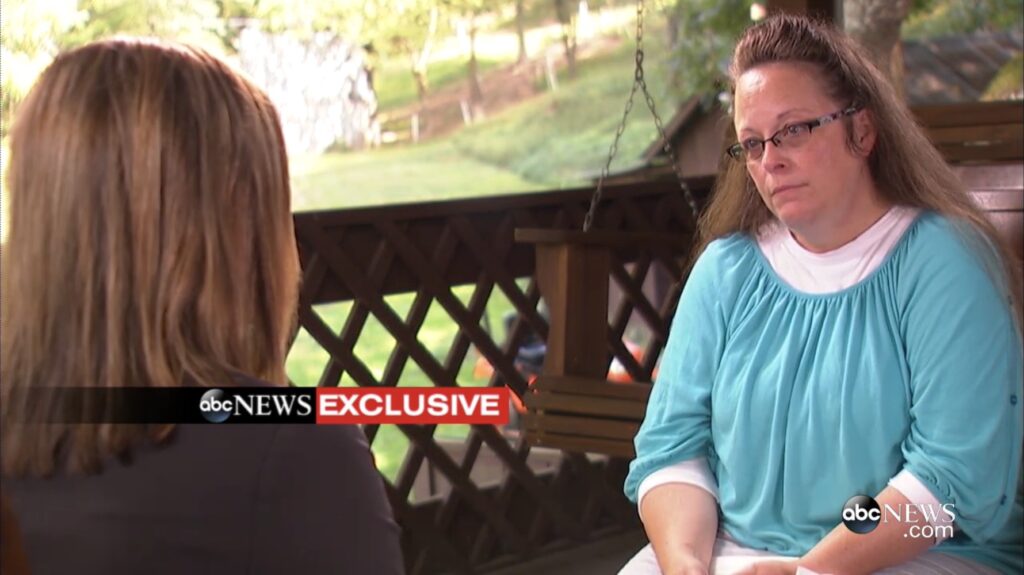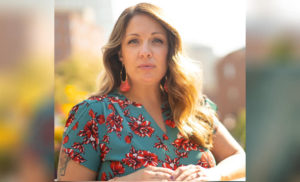Kentucky county clerk Kim Davis, who refused gay marriage applicants on religious grounds, to appeal latest judgment
A federal judge has awarded a gay couple damages of over $260,000 in the case of former county clerk Kim Davis, who refused to issue a marriage license as a matter of religious conscience.
The…

A federal judge has awarded a gay couple damages of over $260,000 in the case of former county clerk Kim Davis, who refused to issue a marriage license as a matter of religious conscience.
The amount is in addition to the jury’s previous award of $100,000 to the couple, according to the Associated Press.
In 2015, Davis, now 58, objected to issuing the marriage license to gay couples because it conflicts with her Christian belief that marriage is between one man and one woman.
When the court ordered her to issue the license, Davis stopped issuing marriage licenses for any couples, whether gay or straight, and was subsequently jailed for contempt of court.
Davis’ attorneys at Liberty Counsel are planning to appeal the $260,000 judgment.
“This latest judgment now allows Liberty Counsel to ask the Court to reverse the jury’s verdict against Davis because there was insufficient evidence to award the plaintiffs monetary damages,” said Liberty. “If the motion is denied, Liberty Counsel will then appeal the case to the Sixth Circuit Court of Appeals.”
Liberty said direct evidence in the case showed there was no basis for damages.
The allegations forming the basis for those damages is that one of the gay persons, David Ermold, was terminated from employment from the University of Pikeville because of the case.
Liberty says that testimony from the case contradicts the allegations of damages because of termination of employment.
“During the trial, the Human Resource Director [at Pikeville] testified that was not true and that Ermold’s position was downsized along with other positions,” said Liberty. “Losing their basis to allege damages, the Ermold plaintiffs then changed gears during the trial to allege they should receive damages for hurt feelings.”
Davis’ attorneys also allege that U.S. District Judge David L. Bunning improperly excluded from the jury pool those people who have a religious objection to same-sex marriages by allowing the plaintiffs to question potential jurors’ religious beliefs about same sex marriage.
“That question essentially excluded jurors based on religion, which is unlawful under current legal precedent and federal law,” said the attorneys.
It’s not the first time the judge has issues pro-LGBT rulings on controversial issues in Kentucky.
In 2003, Bunning, 57, ordered the rural school system in Boyd County, Kentucky to open its doors to the Gay-Straight Alliance, said the New York Times.
It’s also not the first time people have questioned Bunning’s judgment.
A majority of the Standing Committee on the Federal Judiciary of the American Bar Association (ABA) submitted statements to the Senate that claimed that Bunning was not qualified for the judiciary when he was nominated to the bench by Pres. George W. Bush in 2001.
The ABA’s recommendation to the Senate “was based on several, serious concerns relating to his competence.”
The statement said that Bunning’s civil case experience was “limited and shallow.”
“It includes no exposure to, let alone experience in, complex civil matters that regularly find their way to federal district courts,” the ABA wrote.
Bunning, whose father was former major-league pitcher and long-time Kentucky politico, Jim Bunning, had his nomination approved unanimously by the Senate.
Jim Bunning served in the U.S. Senate from 1999 to 2011.
“This case is far from over. Because of Kim Davis, every clerk in Kentucky now has the freedom to serve as an elected official without compromising their religious convictions and conscience,” noted Liberty Counsel Founder and Chairman Mat Staver.
Following the court order demanding Davis issue the license, Kentucky’s then-governor Matt Bevin issued an executive order that no longer required county clerks’ names to appear on marriage certificates, which was the heart of Davis’ objection.



